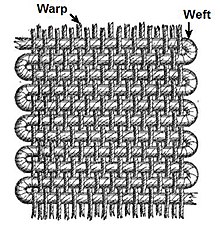
Back Weef AF ሽመና AM نسج Arabic توخوجولوق AZB Туҡыусылыҡ BA Paghabol BCL Ткацтва BE Ткацтва BE-X-OLD Тъкане Bulgarian তাঁতে কাপড় বোনা Bengali/Bangla



Weaving is a method of textile production in which two distinct sets of yarns or threads are interlaced at right angles to form a fabric or cloth. Other methods are knitting, crocheting, felting, and braiding or plaiting. The longitudinal threads are called the warp and the lateral threads are the weft, woof, or filling. The method in which these threads are interwoven affects the characteristics of the cloth.[1] Cloth is usually woven on a loom, a device that holds the warp threads in place while filling threads are woven through them. A fabric band that meets this definition of cloth (warp threads with a weft thread winding between) can also be made using other methods, including tablet weaving, back strap loom, or other techniques that can be done without looms.[2]
The way the warp and filling threads interlace with each other is called the weave. The majority of woven products are created with one of three basic weaves: plain weave, satin weave, or twill weave. Woven cloth can be plain or classic (in one colour or a simple pattern), or can be woven in decorative or artistic design.
- ^ Collier 1974, p. 92.
- ^ Dooley 1914.